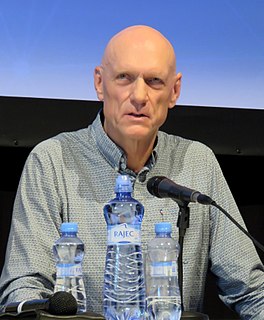A Quote by John F. Kerry
You might not see climate change as an immediate threat to your job, your community, or your families," Kerry said. "But let me tell you, it is." He continued, "climate change is directly related to the potential of greater conflict and greater instability. I'm telling you that there are people in parts of the world - in Africa today, they fight each other over water. They kill each over it. And if glaciers are melting and there's less water available and more people, that is a challenge we have to face.
Quote Topics
Africa
Available
Challenge
Change
Climate
Climate Change
Community
Conflict
Directly
Each
Face
Families
Fight
Glaciers
Greater
Immediate
Instability
Job
Kerry
Less
Let Me
Me
Melting
Might
More
More People
Other
Our Community
Over
Over It
Parts
People
Potential
Related
Said
See
Tell
Telling
Threat
Today
Water
World
Your
Related Quotes
Climate change is directly related to the growth of terrorism. And if we do not get our act together and listen to what the scientists say, you're going to see countries all over the world struggling over limited amounts of water, limited amounts of land to grow their crops ask you're going to see all kinds of international conflict.
...the world needs to face up to the challenge of climate change, and to do so now. It is clear that climate change poses an urgent challenge, not only a challenge that threatens the environment but also international peace and security, prosperity and development. And as the Stern report showed, the economic effects of climate change on this scale cannot be ignored, but the costs can be limited if we act early
With the growth of the world population, the global climate change and the need for a greater healthy environment, access to water resources has become a crucial condition for the realization of an equitable international order, where the needs of the peoples are effectively addressed. In this regard, the need for international cooperation, including in joint effort with relevant non-state actors, is paramount to ensure water is made available to all without discrimination. Water is a human right, an enabling right, not a mere commodity.
All over East Africa-indeed, all over Africa-it is normal for people to walk a kilometer or two or six for water. In more arid areas, people walk even greater distances, and sometimes all they find at the end is a pond slimy with overuse. More than 90 percent of Africans still dig for their water, and waterborne diseases such as typhoid, dysentery, bilharzia, and cholera are common. The bodies of many Africans are a stew of parasites. In some areas the wells are so far below the earth's surface that chains of people are required to pass up the water.
But no matter how big the effort to push a propaganda line might be, climate change is bigger. This, undoubtedly and regrettably, is the biggest immediate long-term environmental challenge we face. A failure to concretely come to some policy outcome on climate change has not only a negative environmental impact but also social and economic consequences for us.
It's very hard to track down what's real and what's not real. We haven't absorbed what climate change is doing. Because whether people associate it or not, fear of immigration is completely related to climate change, because the mass migrations that are happening, the war in Syria, all of these structural human migrations are related to climate change.
Water is one of the most basic of all needs - we cannot live for more than a few days without it. And yet, most people take water for granted. We waste water needlessly and don't realize that clean water is a very limited resource. More than 1 billion people around the world have no access to safe, clean drinking water, and over 2.5 billion do not have adequate sanitation service. Over 2 million people die each year because of unsafe water - and most of them are children!
Despite the international scientific community's consensus on climate change, a small number of critics continue to deny that climate change exists or that humans are causing it. Widely known as climate change "skeptics" or "deniers," these individuals are generally not climate scientists and do not debate the science with the climate scientists.
I think the challenge of climate change in particular is the challenge for us to create and produce new norms for a new kind of world. And that's why I think as important as the issue of climate change is, it's even more important than it seems because if we can't evolve very quickly, new norms to deal with issues like climate change, we're not going to be able to survive in the kind of world we've created. So I think, really, the whole nature of democracy, of governance, of global community and of solving the kinds of problems of the 21st Century are really at stake.

































